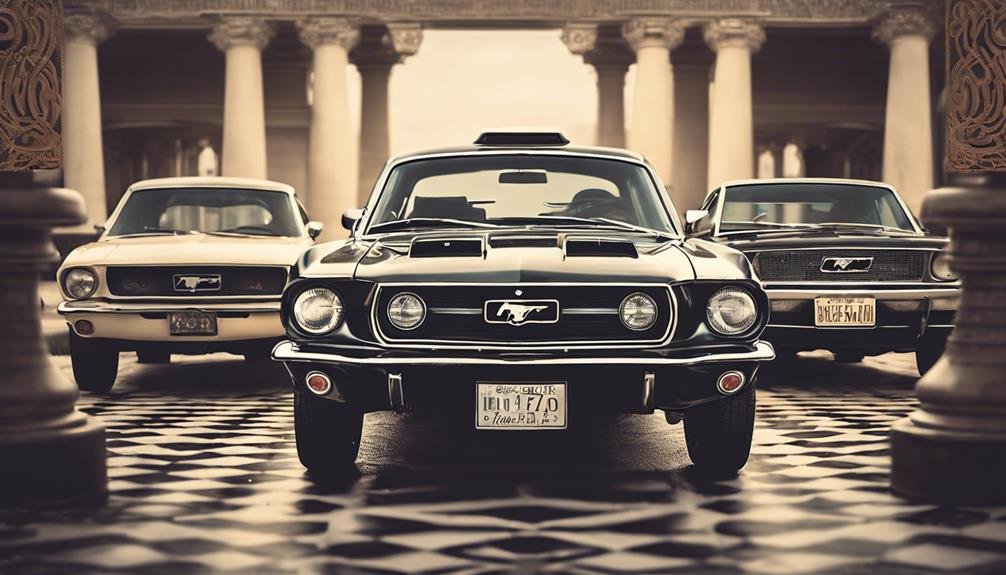You've likely wondered how popular car brands got their names, and the stories behind them are often fascinating and reflective of the companies' values and heritage. Take Audi, for instance, whose name originates from the Latin translation of founder August Horch's surname, meaning 'listen.' Or Mercedes-Benz, named after founder Karl Benz's daughter, Mercedes, incorporating a personal touch and heritage. Other brands, like Volvo, Fiat, and Hyundai, have origins rooted in Latin, Italian, and Korean cultures, respectively. As you investigate the origins of popular car names, you may uncover more surprising connections between brand identities and their rich histories.
Key Takeaways
- Car names often originate from Latin roots, founder's names, or geographical inspirations, revealing the brand's heritage and identity.
- Founders' names, like Horch in Audi, or personal experiences, like Lionel Martin's success at Aston Hillclimb, are commonly used in car brand names.
- Geographical locations, such as Spain in SEAT or Japan in Toyota, influence car brand names and model names, reflecting cultural roots.
- Performance and innovation are also reflected in car brand names, like Ferrari's high-performance sports cars or Honda's inventive engine technology.
- Cultural and historical references, like Toyota Land Cruiser's rugged off-road capabilities, contribute to a brand's unique identity and customer recognition.
Latin Roots and Heritage
As you delve into the world of car names, you'll discover that many of them have roots in Latin, showcasing a rich heritage that influences their brand identities.
Audi's name, for instance, originates from the Latin translation of founder August Horch's surname, meaning 'listen.'
Mercedes-Benz, on the other hand, was named after founder Karl Benz's daughter, Mercedes, incorporating a personal touch and heritage.
Volvo's name stems from the Latin word 'volvere,' meaning 'I roll,' reflecting its focus on safety and Nordic style.
Fiat's acronym stands for 'Fabbrica Italiana Automobili Torino,' emphasizing its Italian heritage and origin in Turin.
Remarkably, Hyundai's name, meaning 'modern times' in Korean, mirrors the company's ambition for cutting-edge cars and innovation.
These Latin roots and heritage play a significant role in shaping the brand identities of these iconic car manufacturers.
Founders and Pioneers
Beyond the Latin roots that shape brand identities, you'll find that many car names pay tribute to the visionaries who pioneered the automotive industry, with founders and innovators leaving an indelible mark on their respective companies.
Take, for instance, August Horch, who founded Audi in 1899, with the name derived from the Latin translation of Horch, meaning 'listen'. Likewise, Cadillac, founded in 1902, pays homage to French explorer Antoine Laumet de Cadillac, synonymous with luxury car manufacturing.
In another example, Aston Martin, founded in 1913 by Lionel Martin and Robert Bamford, owes its name to Martin's success at Aston Hillclimb. Chevrolet, founded in 1911 by Louis Chevrolet and William C. Durant, also honors its founders.
These pioneers of car manufacturing have left an enduring legacy, shaping the automotive landscape. Their pioneering spirits and entrepreneurial drive paved the way for the industry we're familiar with today.
As you delve into the world of cars, you'll realize that many brand names are, in fact, tributes to these visionaries who dared to dream big.
Geographical Inspirations

How do car names reflect the geographical origins of their manufacturers? As you investigate the world of cars, you'll notice that many brands draw inspiration from their geographical roots. Let's take a closer look at some examples.
| Brand | Geographical Inspiration |
|---|---|
| SEAT | Spanish heritage, with models named after locations in Spain |
| ŠKODA | Imaginative names inspired by Kodiak Island residents |
| Volvo | Nordic style and safety features, with a Latin meaning of 'I roll' |
| Toyota | Japanese culture, with names like Corolla meaning 'little crown' and Camry meaning 'crown' |
| Volkswagen | German roots, with a name meaning 'people's car' and models named after wind systems |
As you can see, car brands often reflect their geographical origins in their names. SEAT, for instance, honors its Spanish heritage by naming models after locations in Spain. In the same vein, Volvo incorporates Nordic style and safety features, while Toyota's names reflect Japanese culture. Even Volkswagen's name means 'people's car' in German, showcasing its geographical inspiration. By delving into these geographical inspirations, you'll gain a deeper understanding of the stories behind these iconic brands.
Performance and Innovation
You'll find that Ferrari, Audi, BMW, McLaren, and Honda have all made their mark on the automotive world through exceptional performance and groundbreaking design.
Ferrari's high-performance sports cars and dominance in Formula 1 racing have cemented its reputation as a leader in the industry.
Audi, with its name derived from the Latin translation of founder August Horch's surname, reflects its focus on luxury and creativity, showcasing its commitment to excellence.
BMW, originating in Bavaria, Germany, is known for its luxury vehicles, performance, and iconic design, earning its reputation as a leader in the Bavarian Motor tradition.
McLaren, founded in 1963, is celebrated for its racing titles and high-performance sports cars, demonstrating its commitment to original design.
Honda, with a strong presence in motorsports, is recognized for its inventive engine technology and commitment to excellence, solidifying its position as a leader in high-performance vehicles.
These brands have pushed the boundaries of engine technology, original design, and motorsports, redefining the standards of high-performance and excellence in the automotive industry.
Cultural and Historical References

Many car names pay homage to their cultural heritage and historical roots, reflecting the brand's values and origins in their monikers. You'll find that some car names draw inspiration from geographical locations, animals, nature, or mythical figures to create a unique identity. For instance, the Toyota Land Cruiser's name is derived from its rugged, off-road capabilities, evoking the idea of exploration and adventure.
| Car Name | Inspiration |
|---|---|
| Mustang | Wild Horse, symbolizing freedom and power |
| Sierra | Mountain range in California, conveying strength and resilience |
| Dakota | Geographical region in the United States, representing ruggedness and reliability |
Understanding the historical context behind car names provides insights into the brand's values and origins. Memorable names contribute to brand recognition, customer loyalty, and success in the automotive market. Successful naming strategies are trademarked to protect intellectual property and maintain brand consistency over time. By incorporating cultural heritage and historical references into their names, car manufacturers can create a lasting impression on customers and establish a strong brand identity.
Frequently Asked Questions
What Is the Most Famous Car Name?
You're wondering what the most famous car name is, and honestly, it's a tough call, but if you had to pick one, it's possibly the 'Ford Model T', revolutionizing the auto industry with mass production techniques back in the day.
What Are Some Cool Car Names?
You're looking for cool car names, and you've come to the right place! From sleek Aston Martins to powerful Lamborghinis, you'll find a list of iconic brands that'll get your heart racing and make you feel like a total boss on the road.
What Is the Most Popular Name for a Car?
You're wondering what the most popular name for a car is? Well, it's the Toyota Corolla, with over 44 million units sold worldwide as of 2021, making it the best-selling car of all time!
What Are 10 Most Popular Cars?
You're wondering what the 10 most popular cars are, right? Well, you'll find models from Toyota, Honda, Ford, and Chevrolet on the list, offering reliability, performance, and affordability that cater to your diverse needs and preferences.
Conclusion
As you've delved into the origins of popular car names, you've uncovered a rich tapestry of Latin roots, pioneering founders, geographical inspirations, performance-driven innovations, and cultural references.
From the Latin-derived Mustang to the geographically-named Sierra, each name tells a story of its brand's heritage, values, and vision.
By comprehending the origins of these iconic names, you've gained insight into the automotive world's intricate history, cultural nuances, and inventive spirit.
